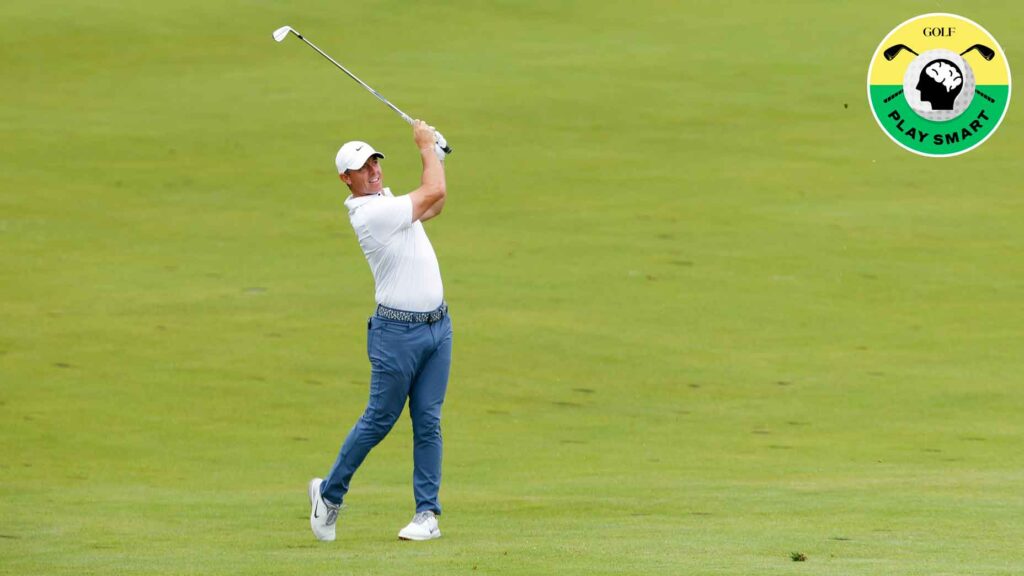Unlocking Lower Scores: Rory McIlroy’s Smart Strategies for Amateur Golfers
By: Zephyr Melton | June 18, 2025
Golf is an exhilarating sport, offering enjoyment and competition across skill levels. While every golfer has their own approach to the game, shooting lower scores universally enhances the experience. The thrill of accomplishing a personal best, whether you’re a seasoned player or a weekend warrior, cannot be understated. With that said, the journey to achieving lower scores isn’t always straightforward; it requires time, effort, and, often, a smart game strategy.
One of the foremost voices in the golf community, Rory McIlroy, recently shared valuable insights on how recreational players can effectively lower their scores. His tips, forged in the crucible of professional play and pro-am experience, prove that smarter strategies can yield impressive results, even for those with limited time to dedicate to the sport.
The Importance of a Smart Strategy
In today’s fast-paced world, many golfers find it challenging to commit hours to practice or to refine their skills. Yet, having a well-thought-out strategy can significantly impact score improvement. Before delving into the specifics of McIlroy’s advice, it’s essential to understand why a smarter approach can lead to lower scores without overly complicating the game.
Playing strategically doesn’t necessarily mean deep analysis of statistics or intense practice sessions. Instead, it focuses on making intelligent decisions during play and understanding one’s capabilities on the course. This fundamental shift in mindset can drastically lower scores, allowing players to enjoy the game even more.
McIlroy’s Key Advice: Play Smart
Rory McIlroy, one of golf’s finest players, not only sees many swings in professional settings but also regularly engages with amateur golfers during pro-am events. From these experiences, McIlroy notices common pitfalls that lead to higher scores for weekend players. His key advice: play smarter, not harder.
"I think sometimes it’s just more they try to take shots on or they try to hit a shot that they probably could pull off once or twice out of 10 instead of playing a little bit more percentage," he notes. The takeaway? Focus on realistic shots and maintain a strategy that prioritizes minimizing risk.
Realism on the Golf Course
Understanding your skill level and limitations is critical for anyone looking to improve their game. Many amateur players tend to bite off more than they can chew, often attempting challenging shots that increase the likelihood of mistakes. McIlroy advocates for a more conservative approach, suggesting players opt for safer plays instead of risky ones.
When you acknowledge your realistic shot-making abilities, you can align your strategy accordingly. This doesn’t mean you shouldn’t challenge yourself, but rather that there’s merit in measuring risk versus reward during your rounds.
Eliminating Penalty Strokes
One of the most effective ways to lower your scores is by avoiding penalty strokes. According to McIlroy, simply reducing the number of catastrophic swings can lead to dramatic score improvements. By playing more conservatively and selecting safer shots, you’re less likely to find yourself in tough situations that lead to penalties.
Amateur golfers often face penalties from losing balls, hitting into hazards, or attempting risky shots that result in penalties. Focusing on reducing these penalties can transform your play and lead to lower scores in a remarkably straightforward manner.
The Power of Course Strategy
A well-thought-out course management strategy can spell the difference between a challenging round and a successful one. By analyzing the course layout and making informed decisions about which clubs to use and which shots to play, you can take control of your game.
McIlroy emphasizes understanding the terrain, identifying trouble spots, and knowing where to play safe. Rather than forcing aggressive shots, let the course guide your choices. This can lead to more pars and fewer double-bogeys, steadily inching your scores downward.
Learning from Pro-Am Experiences
During pro-am events, McIlroy observes various playing styles and strategies. He notes that many recreational players operate under the misguided notion that they need to emulate the pros. However, the differences in skill level and technique are often stark, making such comparisons counterproductive.
Instead of trying to mimic professional techniques, focus on what works best for you. McIlroy’s observations in these pro-am settings reveal that simply paying attention to your strengths can unlock new levels of play. Finding your unique playing style will allow you to enhance your game without feeling overwhelmed.
Sharpening Mental Acuity
Mental fortitude is integral to golf success. Beyond technical skills, a calm and focused mindset can lead to better decision-making and reduced errors on the course. McIlroy highlights the importance of remaining composed and confident in your choices when faced with challenging shots.
Recognizing that golf is as much a mental game as a physical one means embracing strategies to enhance your mental acuity. Techniques like visualization, deep breathing, and maintaining a positive mindset can significantly impact your performance and, consequently, your scores.
Continuous Improvement
Lowering your score is not merely a destination; it’s a journey requiring continual improvement and introspection. Embracing McIlroy’s strategies offers a solid foundation for growth, but it’s up to you to put in the effort. Regular reflection on your rounds, analyzing your decisions, and adjusting strategies accordingly can lead to consistent improvement.
Practice and feedback, whether from peers or through video analysis, can also pave the way for enduring success. Emphasizing growth and fine-tuning your approach will yield benefits in the long run, allowing you to enjoy each round more fully.
Conclusion: A Smarter Path to Lower Scores
Ultimately, shooting lower scores is attainable for all golfers, regardless of experience level. By being realistic about your capabilities, focusing on smarter play, and minimizing penalties, you can transform your game for the better. Take a page from Rory McIlroy’s book; adopt his strategies, stay composed, and commit to continuous improvement.
Golf is not just about the scores—it’s about enjoying the game and growing as a player. So, as you head to the course, remember to play smart, make informed choices, and relish in the journey towards personal bests!


